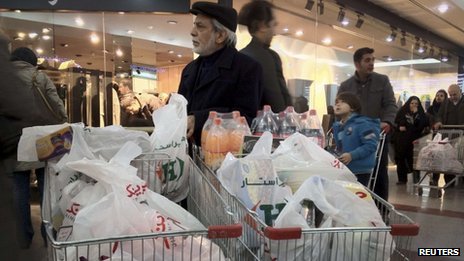UPDATES
Oil prices worsen Iran’s Sanctions woes
June 8, 2012 | Andrea Nadel

The impact of international sanctions on Iran’s ability to do business with its neighbours as it pursues its controversial nuclear program is an issue that AIJAC has followed closely.
What is clear now is that the Iranian economy is in a state of sharp decline as sanctions cripple Iran’s ability to do business with its neighbours (background information by AIJAC Policy Analyst Sharyn Mittleman can be found here, as well as here).
This decline is today being exacerbated by the fact that oil prices are falling worldwide, and are expected to continue to do so.
Moreover, there is new evidence these dynamics, combined with governmental mismanagement (about which AIJAC Policy Analyst Allon Lee has written here), are combining to significantly affect the lifestyle of the average Iranian – especially in terms of prices for basic food staples.
In recent months, Iran’s economic isolation has increased as the European Union, Japan, South Korea and other countries have announced or quietly begun to implement boycotts of that country’s oil. Now Turkey, Iran’s 5th largest oil customer, and generally a critic of sanctions against Teheran, has also joined in, announcing its intentions to cut Iranian crude imports by 20 percent next month.
What’s more, as a result of sanctions imposed by the West to discourage governments and private entities from doing business with Iran, Iran is now in the position of having to offer substantial discounts to those countries that are willing to buy its oil (such as China and India).
These dynamics combined create a vicious cycle for Iran, as a shrinking list of buyers will force Iran to sell its oil at continually steeper discounts and further limit its access to foreign currency (as well as its ability to use that currency for anything other than buying in local markets).
These dynamics are made even more potent by the recent decline in world oil prices. Analyst and recent visitor to Australia Emanuele Ottolenghi notes in an examination of the issue that:
“…For the first time since the beginning of international sanctions against the regime in Tehran, oil prices are in free fall. […] For Iran, this is bad news. For years, the regime was able to somewhat cushion the combined impact of externally imposed sanctions and self-inflicted economic mismanagement thanks to high oil prices. No more.”
The decline is attributed to a combination of factors, including slackened demand thanks to the ongoing struggling global economy, and increased oil production by Saudi Arabia and Iraq.
Considering that the sale of oil generates roughly 80% of Iran’s public revenue, the combined effects of global boycotts only tighten the squeeze that much more.
Moreover, Iran is likely to need that revenue more than ever to placate restive citizens whose standard of living is increasingly being squeezed.
According to figures released by the Iranian government, basic food staples have dramatically increased in price since last year, including chicken (by 57.1 percent), red meat (by 39 percent), beef (by 48.5 percent) and vegetables (by 78.6 percent).
These soaring prices are also the result of years of mismanagement by the government, which subsidised the cost of basic goods for decades but stopped doing so recently. American Middle East analyst (and another recent visitor to Australia) Michael Rubin notes that:
“The increase in food prices has far less to do with sanctions than it does to basic regime mismanagement of the Iranian economy. Importantly, when the economic going gets tough in Iran, Iranians hold their government accountable and seem impervious to regime attempts to pin the blame on sanctions or outsiders. Iranians who travel to the United Arab Emirates, Pakistan, Turkey, and even Afghanistan see that even poor citizens of those countries have an easier time feeding their families.”
Indeed, there is evidence Iranians are blaming their economic frustration and hardship not on the West, as the clerical ruling class might hope, but instead on their own government. In recent elections, voters like 18-year-old student Mohammad Ali Parvazdavani, felt that their leaders “should be brave and say what the real problems are and try to solve unemployment, and fix the economy to the best of their ability.”
Of course, given that the senior leaders of the political opposition to the current regime have been kept under house arrest for the past year and were excluded from the recent elections held in March, it seems unlikely the regime will listen to voters like Mr. Parvazdavani.
Given recent developments, it is clear that the Iranian economy is suffering as international sanctions have starved it of crucial revenue streams and falling oil prices have further devalued Iranian oil in an ever-shrinking global market.
Iranian citizens, whose large-scale dissatisfaction with the regime was clear during the unsuccessful “Green Revolution” of 2009-2010, are feeling the pinch, made worse by the government’s chronic mismanagement. And the government is likely to increasingly lack the wherewithal to buy off discontent with welfare and other benefits.
Moreover, it does not appear that these downward trends will be reversing any time soon. It thus appears that the race to force the Iranian regime to change course on its nuclear program before progress passes the point of no return appears to be on in earnest.
Andrea Nadel
Tags: International Security





